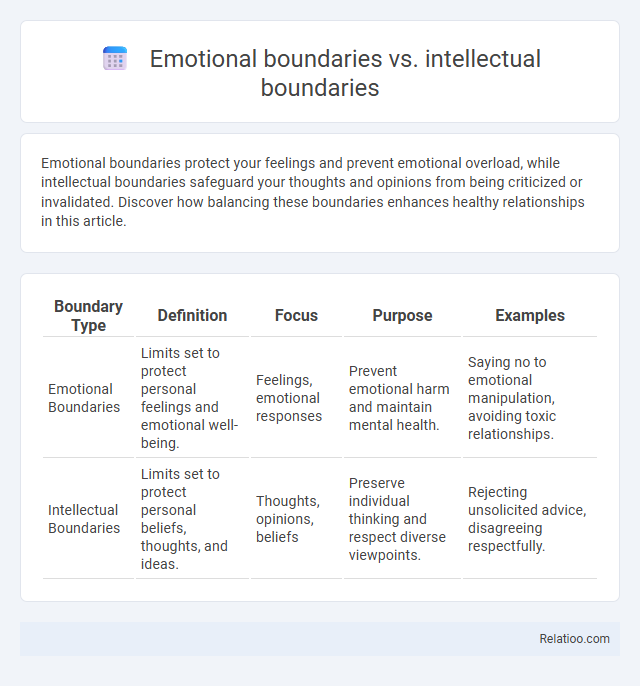Emotional boundaries protect your feelings and prevent emotional overload, while intellectual boundaries safeguard your thoughts and opinions from being criticized or invalidated. Discover how balancing these boundaries enhances healthy relationships in this article.
Table of Comparison
| Boundary Type | Definition | Focus | Purpose | Examples |
|---|---|---|---|---|
| Emotional Boundaries | Limits set to protect personal feelings and emotional well-being. | Feelings, emotional responses | Prevent emotional harm and maintain mental health. | Saying no to emotional manipulation, avoiding toxic relationships. |
| Intellectual Boundaries | Limits set to protect personal beliefs, thoughts, and ideas. | Thoughts, opinions, beliefs | Preserve individual thinking and respect diverse viewpoints. | Rejecting unsolicited advice, disagreeing respectfully. |
Understanding Emotional Boundaries
Understanding emotional boundaries involves recognizing and respecting your own feelings and limits while interacting with others, which protects your mental health and promotes healthy relationships. Emotional boundaries differ from intellectual boundaries, which pertain to respecting differing opinions and ideas, and accessibility, which relates to availability and responsiveness. Establishing clear emotional boundaries helps prevent emotional exhaustion and fosters mutual respect.
Defining Intellectual Boundaries
Defining intellectual boundaries involves recognizing and respecting the limits of your own and others' thoughts, opinions, and beliefs without imposing or internalizing them. Intellectual boundaries protect Your mental space by allowing open yet respectful dialogues, preventing emotional overload or manipulation stemming from conflicting ideas. Establishing these boundaries enhances critical thinking, promotes healthy communication, and safeguards cognitive well-being.
Key Differences Between Emotional and Intellectual Boundaries
Emotional boundaries protect your feelings and define how much emotional energy you invest in relationships, while intellectual boundaries safeguard your thoughts, ideas, and beliefs from being manipulated or invalidated. Emotional boundaries regulate your reactions to others' emotions, whereas intellectual boundaries maintain respect for your cognitive autonomy and differences in opinion. Accessibility relates to how open or available you are to others, but it doesn't specifically address the nuanced separation of emotional or intellectual limits.
Why Emotional Boundaries Matter in Relationships
Emotional boundaries protect your feelings by defining what you are willing to share and accept, ensuring healthy interactions that prevent emotional burnout and resentment. Intellectual boundaries preserve your thoughts and opinions, promoting respect for your ideas without intrusion or judgment. Accessibility balances availability with self-care, allowing you to support others while maintaining your own emotional well-being and space.
The Importance of Intellectual Boundaries in Communication
Intellectual boundaries define the limits of sharing thoughts and beliefs, protecting individuals from mental intrusion and fostering respect for diverse perspectives. Maintaining intellectual boundaries in communication prevents misunderstandings and encourages open, yet respectful, dialogue. Clear intellectual boundaries enhance personal autonomy while enabling meaningful exchanges without compromising individual values.
Signs of Unhealthy Emotional Boundaries
Unhealthy emotional boundaries often manifest as oversharing personal feelings without restraint, difficulty saying no, and feeling responsible for others' emotions. Unlike intellectual boundaries, which protect thoughts and beliefs, emotional boundaries safeguard feelings and prevent manipulation or emotional exhaustion. Poorly managed emotional limits can lead to codependency, emotional burnout, and blurred identity, undermining mental well-being and personal autonomy.
Indicators of Weak Intellectual Boundaries
Indicators of weak intellectual boundaries include difficulty distinguishing one's own thoughts from others', frequent over-sharing of personal opinions, and susceptibility to manipulation or undue influence in discussions. Individuals with weak intellectual boundaries often struggle to maintain privacy regarding their beliefs and may feel overwhelmed by conflicting ideas or criticism. Such vulnerabilities can lead to blurred lines between personal cognition and external input, impacting decision-making and self-identity.
Strategies for Strengthening Emotional Boundaries
Strengthening emotional boundaries involves recognizing and respecting one's own feelings while clearly communicating limits to others, enhancing self-awareness and assertiveness. Techniques include practicing saying no without guilt, engaging in mindfulness to identify emotional triggers, and setting firm limits on emotional labor to prevent burnout. Consistent self-reflection and seeking support through therapy or trusted relationships also reinforce emotional boundaries, distinguishing them from intellectual boundaries which focus on protecting mental space and ideas, and accessibility which relates to the ease of obtaining emotional or cognitive connection.
How to Set and Respect Intellectual Boundaries
Setting intellectual boundaries involves clearly communicating your limits on sharing thoughts, opinions, and ideas to protect your mental space and personal beliefs. Respecting these boundaries means actively listening without judgment, avoiding unsolicited advice or debates, and honoring others' right to hold different viewpoints. Maintaining intellectual boundaries fosters healthy interactions, encourages mutual respect, and prevents cognitive overload or emotional stress caused by invasive or dismissive conversations.
Balancing Emotional and Intellectual Boundaries for Healthy Connections
Balancing emotional boundaries with intellectual boundaries ensures that your relationships remain respectful and fulfilling, allowing you to express feelings while maintaining thoughtful dialogue. Emotional boundaries protect your feelings from being overwhelmed or manipulated, whereas intellectual boundaries safeguard your ideas and opinions from being dismissed or undervalued. Accessibility plays a crucial role in this balance by fostering open communication while honoring personal limits, ultimately promoting healthier connections.

Infographic: Emotional boundaries vs Intellectual boundaries
 relatioo.com
relatioo.com